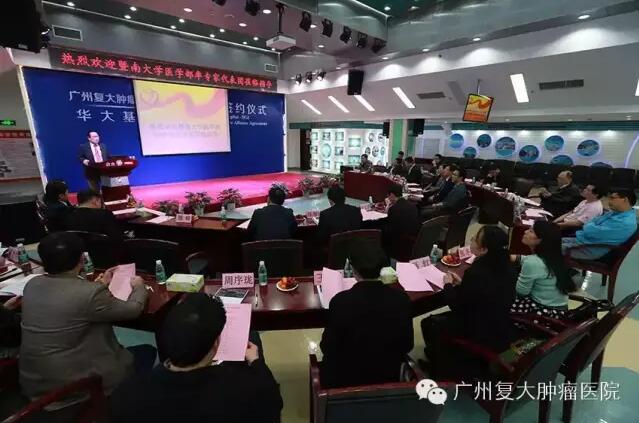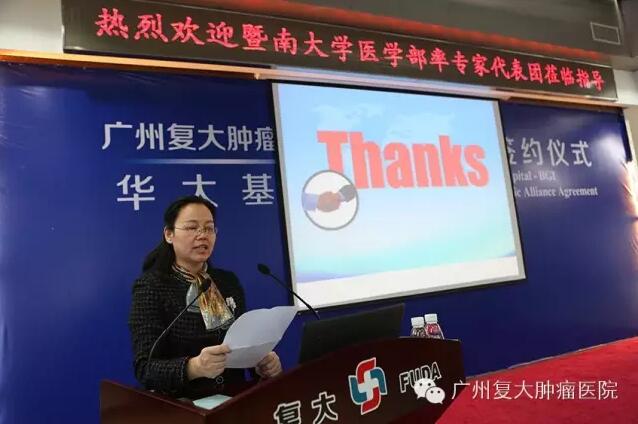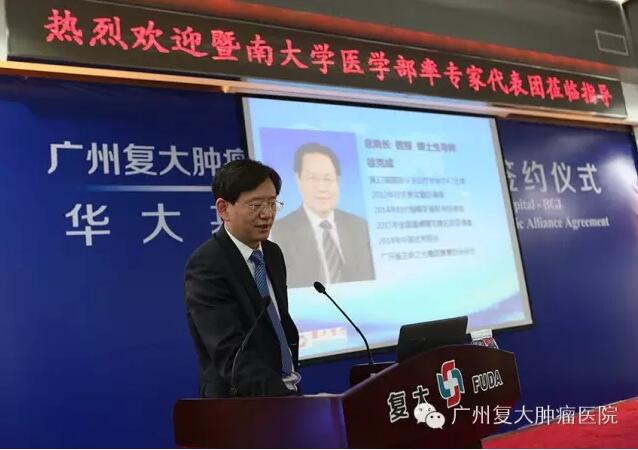Jinan University Medical School Scientific Research Cooperation Invitation Conference was held in the multi-purpose hall of Guangzhou Fuda Cancer Hospital in the afternoon of March 30, 2016. Mr. Ye Wencai, the Vice President of Jinan University, designated Prof. Dong Jun, the Deputy Director of the Department of Clinical Medicine to attend the conference with a delegation of 25 experts, who have made in-depth exchanged with experts and doctors at FUDA on cryosurgery, NanoKnife therapy and immunotherapy for cancer.

In his welcome speech, Xu Kecheng, the Chief President of Fuda Cancer Hospital, expressed his hope to establish a research foundation with Jinan University with a view to enhance the basic and clinical scientific exchanges and cooperation and improve the level of oncobiology and clinical research of both sides. Prof. Dong Jun noted in her speech that “Fuda Cancer Hospital has been enjoying cutting-edge technology and a good social reputation for advanced cancer treatment, and rich resources in clinical cancer research. In March, leaders of both sides reached a consensus on enhancing the scientific and research cooperation in the field cancer treatment.”

Prof. Dong Jun is delivering a speech
At the conference, Prof. Niu Lizhi, the Executive President of Fuda Cancer Hospital introduced to the participants “The Application and Research of Cryosurgery and NanoKnife for Solid Tumors”; Prof. Piao Xianghao introduced to the participants “The Clinical Application and Research of Drug-loading Microsphere for Cancer Treatment”; Dr. Chen Jibing introduced to the participants immunotherapy for cancer. They have also made in-depth exchanged with experts from Jinan University.

Prof. Niu is introducing to the participants Cryosurgery and NanoKnife for cancer
Affiliated to Jinan University Medical School, Fuda Cancer Hospital is a JCI accredited hospital that is devoted to middle and advanced stage cancer treatment. Since its initiation, FUDA has been committing itself to developing the hospital through science and technology and gathered a group of scholars and experts at home and abroad for the exploration of ways for cancer treatments. FUDA has introduced the world’s most advanced technology for cancer treatment, including cryo-ablation, NanoKnife, etc. FUDA has been leading the way in the medical industry. The number of cryo-ablation for cancer that stands at over 10,000, ranking the first in the world; Cryosurgery for Cancer, the first monograph on cryosurgery in the world, has been published; New Technique of Cancer Ablation: Irreversible Electroporation, the first monograph on NanoKnife has been published; the number of NanoKnife done ranks the first in mainland China.
It is the technique feature of Fuda Cancer Hospital to choose for patients with multiple mini-invasive treatments or sequence treatments that includes cryo-ablation, NanoKnife, immunotherapy (including cancer stem cell vaccine, CAR-T, NK, etc.), cancer microvascular intervention and TCM therapy according to particular cases. The technique feature has allowed for thousands of middle and advanced stage cancer patients improved quality of life and prolonged lifespan. In 2010, Fuda Cancer Hospital became one of the National Key Clinical Cancer Specialized Centers designated by the Ministry of Health and Guangdong Key Clinical Cancer Specialized Centers.
As the first few hospitals that introduced NanoKnife in mainland China in 2002, Fuda Cancer Hospital has completed the most cases of cryosurgery in the world as of today. FUDA has been successively awarded “Special Award of Merit for Cryosurgery” by International Society of Cryosurgery and “Outstanding Contribution Award” by Chinese Conference of Minimally Invasive Therapy in Oncology, etc. Fuda Cancer Hospital has been officially accredited by International Society of Cryosurgery as the Training Center of Cryosurgery in Asia Pacific.
Devoting to the concept of developing the hospital through science and technology, the medical team of FUDA has treated cases one after another that were claimed to be untreatable and incurable and thus has given many cancer patients a second life.